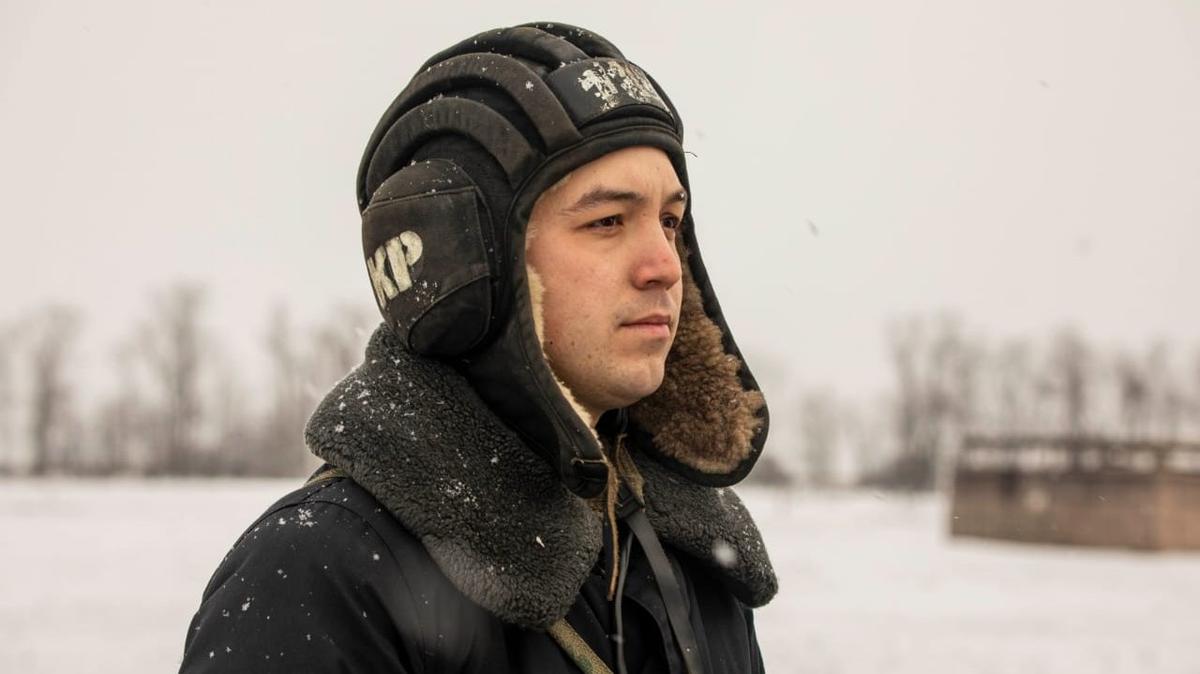Two months ago, Aleksandr Baturin, 25, a senior lieutenant from Russia’s Bashkortostan, was killed near Luhansk in Ukraine. The military commissariat informed his mother Lyudmila of his death, requesting a sample of her DNA to identify the body. According to his fellow officers, a projectile hit the tank that Aleksandr was in, which caused the tank’s ammunition to explode. There was no chance that the crew could survive the explosion.
But when the hospital in Rostov where the bodies of deceased Russian soldiers were brought compared the DNA samples provided by Aleksandr’s parents and the remains collected from the tank, there was no match. The medical experts concluded that Baturin was not in the tank at the time of the explosion. He is currently considered missing in action, while the commanders of his regiment cannot be reached. His mother is still trying to find him, dead or alive, but she is starting to lose faith. Novaya Gazeta. Europe tells the story of the deceased Russian soldier whose remains are just an afterthought for his Motherland.
Aleksandr Baturin, or Sasha for short, was born in Birsk, a small town in Russia’s Bashkortostan. After graduating high school, he got accepted into the Kazan Higher Tank Command School, and then he was sent to a military unit in Russia’s Voronezh region. He was appointed squad commander and got the title of senior lieutenant.
“He started preparing for the tank school in seventh grade. He was an athletic guy. He didn’t drink or smoke. If you talk to any of his teachers, you’ll hear about how kind he was to them. When he was on leave, he would always visit the school with flowers, cakes, champagne, to see his teachers. And when he got accepted into the tank school, it was a little hard for him, of course, it’s a military institution, after all. But he graduated without any problems. He participated in cultural and sports events, he did a lot of work in his unit. He also did tank biathlon, there even was an article about him in the Krasnaya Zvezda newspaper. He was a very responsible guy. This is why he returned to the frontline after he got a concussion (during Russia’s invasion of Ukraine — editor’s note). I spoke to him after that, he told me that he’s got tinnitus and headaches. I told him that he needs medical treatment, but he told me ‘It’s okay, we’ll get through it.’ He couldn’t abandon his men, he was so worried about them,” Sasha’s mother Lyudmila says.
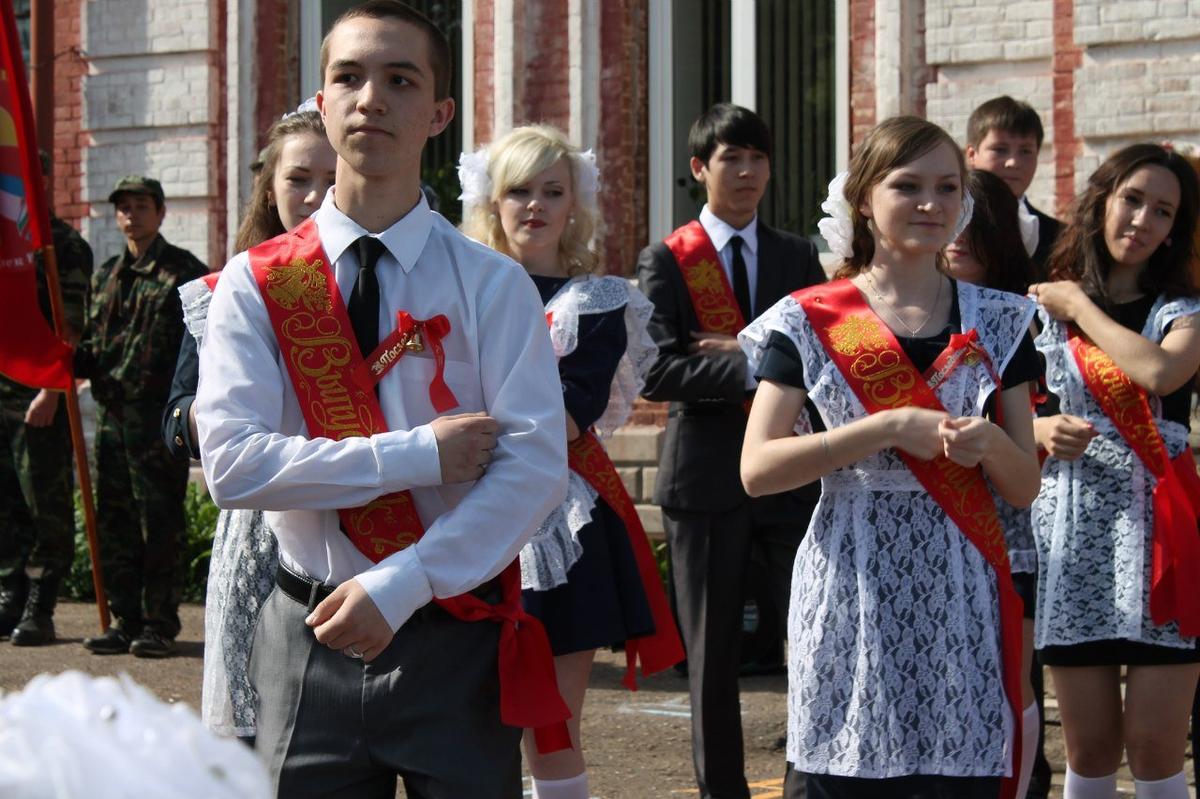
Aleksandr Baturin (left) during high school graduation. Photo from personal archive
In February, Aleksandr was sent to Russia’s Belgorod region near the Ukrainian border to take part in “military exercises.” He did not tell his mother much about what they were doing, and their phone calls only lasted a few minutes. “Mum, I’m alive, I’m well, everything is okay,” was all that he told Lyudmila. Aleksandr’s military unit belonged to the Western Military District, and his tank was marked with the letter Z, which later became a symbol of the Russian invasion.
“They arrived there in February. Where do you think they slept? Do you think there were camp beds set up for them? Of course not. They slept right on the tanks, out in the open. But this is just what I’m assuming, because when I asked him about it, he just said: ‘Mum, it’s not a good question to ask.’
He always told me that when I asked him questions that he couldn’t answer. He said: ‘It’s not a good question to ask, don’t ask me this anymore.’
And he always changed the topic, because he did not have the right to tell me, especially when he was on the other side of the border. All he said was ‘Mum, I’m alive, I’m well, I love you and that’s it. If I started asking questions, he shut me down. It’s a special operation, I understand. Of course, I tried to find out what was happening. But what could he tell me? ‘Everything’s okay, everything’s fine,’” Lyudmila recalls.
“I don’t even know where they were deployed, but I know that they were near Izium, near Mariupol. They took part in all this heavy fighting, but I don’t know where, when and how, because I’m a civilian. Who would even tell me where they were? I don’t have a clue. It’s simply unfair. My son gave his life for this ‘special operation’, and they just wrote him off as missing in action, although everyone says that they saw everything,” Sasha’s mother exclaimed, bursting into tears.
‘There’s something left of the two sergeants, but there’s not even a button left of my son’
Lyudmila lost contact with her son on 7 April. Officers from his military unit later told her that on 11 April, Sasha was already “gone”: he was killed near the village of Kamyanka in the Luhansk region after his tank ammunition exploded.
On 17 April, a military official visited Lyudmila’s house with a document that said that Baturin’s parents must provide their DNA samples to identify their son’s remains. According to the test results, there were no Baturin’s remains in the tank. It is unclear where his body is.
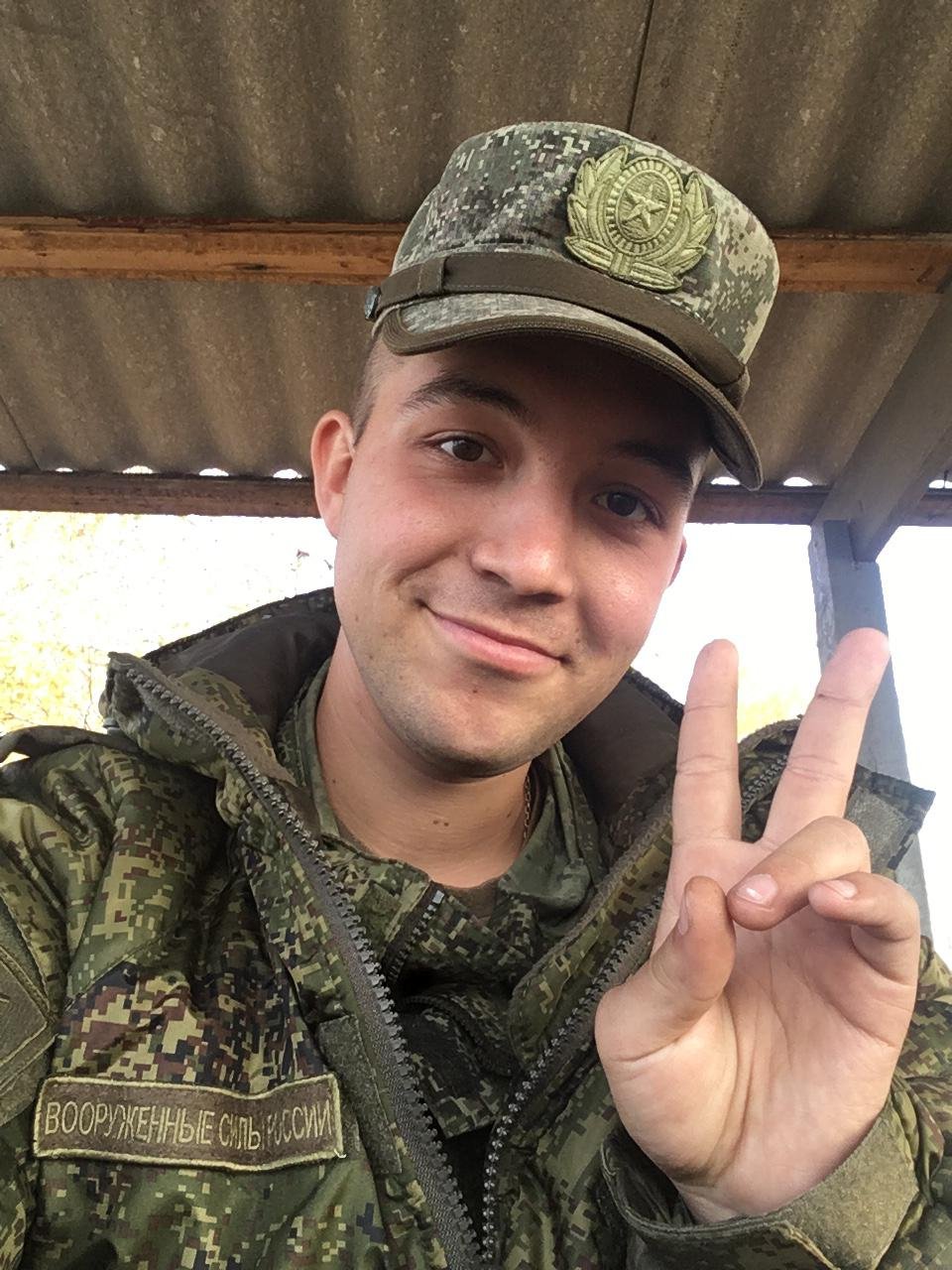
Aleksandr Baturin. Photo from personal archive
“The military commissar said that the tank exploded with the crew inside: him, the senior lieutenant, and two sergeants. This is according to the person who is currently the acting commander of the unit, because the actual commander of the regiment was killed back when my son was still alive during the hostilities there. He said that he currently has no contact with the frontline, however, everyone, including the commander of the battalion and many officers, soldiers, contract servicemen, says that they saw a sabotage team [of the Ukrainian Armed Forces] sneak up on them and attack them. They had no time to fight back. They jumped into the tank to repel the attack, but they didn’t make it. They got hit, and their own ammunition exploded. They say there was a major explosion.
The funeral team collected what they could and brought the remains to Rostov.
You know what surprises me? Why is there something left of the two sergeants, and not even a button left of my son? Nothing. This doesn’t make any sense. I get it, there was an explosion, there could be nothing left of the body, but still, why is there something left of the two of them, and nothing left of my son?
The remains of one soldier were compared to his mother’s DNA samples, and she collected what was left of her son. The second guy was an orphan. It was harder to prove it was him. They needed some personal items: like his hair or a toothbrush taken from his apartment. I submitted all they asked of me, of course: my nails, my hair, my blood. A military officer tasked with collecting all of this sent this package to the hospital in Rostov. They compared it to the remains. They said that there was no match with the remains that they had in their possession. None at all. There was nothing that could even be related to me. Of course, I got my hopes up a little then, I thought that maybe he could still be alive.
Maybe he didn’t make it to the tank, maybe he got thrown back by the blast wave, maybe he didn’t have time to get inside. He was pulled out of the tank once before, he had a concussion, and they sent him to a hospital in Luhansk. He woke up and got back to the frontline. I told him ‘Sasha, you need to go to the hospital.’ And he said: ‘I can’t just stay in bed while my comrades are fighting.’ So, he came back even though he had a concussion. I don’t know, maybe there was a second concussion… Of course, I’m trying to think rationally. I understand that he may have died. I get it. But still, there’s a tiny bit of hope. I’m thinking: what if he was captured while he was unconscious? Why don’t the remains match my samples? It doesn’t make sense! Although they say that they collected the remains of three people. Why doesn’t the third person match me then? I don’t get it. Right now, I’m asking the military unit to contact our military commissar once again, so that they can collect the DNA and blood samples once again, this time both from me and from his biological father,” Lyudmila said.
How does the ‘powder keg’ in Russian tanks work?
Russia’s T-72, T-80 and T-90 tanks, actively deployed in Ukraine all have their ammunition stored right in the hull of the tank, below the cabin. Their armour is 50 mm thick. That is, if any projectile hits the side of the tank, the tank’s ammo will explode and the entire crew will be killed. There are numerous cases of turrets blown off the Russian tanks hit with Javelin anti-tank missile systems.
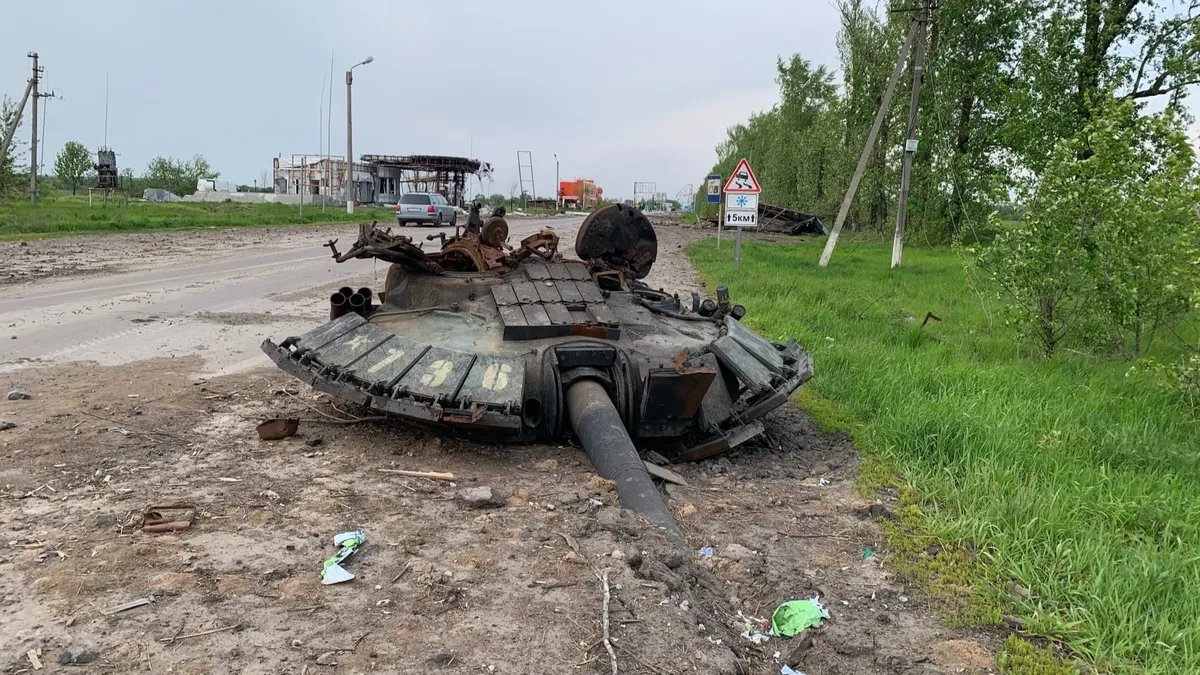
Russian tank with torn off turret. Photo: Olga Musafirova
Essentially, the entire crew of a Russian tank is sitting on a powder keg. In comparison, US-made Abrams tanks and Germany’s Leopard 2 store their ammo in the rear of the tank, not below the cockpit. Russian engineers attempted to copy this design in the T-80 Black Eagle, T-95 and T-14 Armata prototypes and models, however, due to a lack of funding, these tanks can only be seen at military parades.
Mikhail Baryatinsky, reporter and armoured vehicle expert
“The detonation of the tank’s own ammo is quite a common problem. As a rule, if the ammunition is hit, it always explodes. Especially if a cumulative projectile detonates. The consequences of the detonation depend on the location of the ammunition. For example, Russian tanks with autoloaders (an automated mechanism within the tank that reloads ordnance and removes shells — editor’s note) all store their ammunition practically in the floor of the cockpit. If there is an explosion, the turret will be blown off with the crew inside. Naturally, the entire crew will be killed and the tank will be completely destroyed. Tanks that store their ammunition in a different section may be damaged partially. Although as a rule, the detonation of the ammo is inevitable.
All Russian tanks store their ammunition underneath the cockpit. This is because all Russian tanks have autoloaders, except the old T-62 models. All T-72, T-90 and T-80 tanks store their ordnance in the autoloader, which is located underneath the cockpit, under the turret.
The Americans tried to get rid of this problem. They stored part of the ammunition in the turret, which was separated from the cockpit by an armoured partition, and the turret roof had special propelling tunnels. That is, if the tank’s ammunition exploded, the force of the explosion would blow off these panels, and the crew would be practically unharmed. However, this still does not work in practice. The turrets get blasted to shreds. Practically every tank stores lots of large-calibre ammunition. If it detonates, there is no chance for survival.
‘No one called me, no one explained anything to me’
Sasha’s mother said that none of the regiment’s commanders contacted her after his death. Only Gabib Aliyev, the resident psychologist of Military Unit 91711 (that is where her son served), could give her some details, but soon after the first conversation, he stopped picking up his phone. Aliyev did not respond to a phone call from Novaya Gazeta. Europe either.
“All the numbers that I’d called are unavailable now. But I get it, it’s a difficult time, they don’t have time for me, they have enough work to do. I couldn’t contact anyone later because all the numbers were unavailable. Or maybe they blocked my number,” Lyudmila says.
The woman wrote letters to the military prosecutor’s offices of the Voronezh and Ufa garrisons. In early June, she got a response from Ufa, which said that her request was transferred to the Voronezh office. She also wrote a letter to the Russian president, which was transferred to the Defence Ministry.
She got a brief response: if she has a problem with anything, she should go to court.
“No one offers me anything. I’m at the end of my rope. I’m trying to write letters, to ask for help. No one called me and no one told me anything. No one at all.
My son was a man of the state. He was 25, but he came back after a concussion to do his duty for his Fatherland. He wasn’t like other officers, he didn’t stay in the hospital to get out of it, he came back even with a concussion, he came back! You know, it really says a lot about him. Right now, his military unit considers him missing in action, although the acting commander has all the statements from the witnesses who saw the tank explode. They saw him get inside. Then how can he be missing? Do they want me to go to court? Should I be the one to prove that my son was there with them? God, this is just… This is just absurd. Why should it be me, the mother who lost a son, such a wonderful son? I called the Defence Ministry hotline, but they didn’t give me an answer, even though they promised to get back to me,” Lyudmila continued. The woman was crying for most of the conversation.
“The military commissar visited me with this document that said I should provide a DNA sample to identify the remains of the deceased crewmen, and they were sure that they’d get a match. The military unit was absolutely sure, but when they got a negative match, they were all befuddled, as far as I understand.
I didn’t even read the document, I burst into tears. The military commissar started consoling me, of course. He told me: ‘Hey, don’t be upset. You know, sometimes there’s a 50-50 chance, we need to confirm that it’s him.’ And now we’ve confirmed that it’s not him.
What do I do now? How do I find my son? What if he was captured after a concussion? What if he’s unconscious in a hospital somewhere? I have so many questions.
Why do these people then say that they’ve seen everything? I managed to reach the psychologist of the military unit through a third party, who consoled me, of course, said that my son was a real man, a real officer, that there aren’t many people like him. It was the psychologist who told me about the sabotage group, I don’t know anything else. And once again, I was surprised.
I’m a civilian, and I don’t know much about military strategy, but… The saboteurs managed to sneak up on them, but what about the officers standing guard? Why did the saboteurs come so close to the tank, and the boys couldn’t repel the attack? So many questions. I don’t get it. I understand, they did their duty, they jumped into the tank. And they didn’t have time to repel the attack to avoid more death? Or what? These boys were killed alongside him, they were contract soldiers. These two boys, Vorobyev, whose mother collected his remains, and Ukolov, the orphan. These two sergeants were both so young, too, I don’t know how old they were exactly.”
‘The most important thing to me is finding my son’
“I insisted on a second test. If there isn’t a match again, I don’t know what I’ll do. I really don’t. Maybe the funeral brigade didn’t collect all the remains from the tank? Why did it collect enough to identify the two sergeants, and absolutely nothing belonging to my boy? Not even the tiniest bit, can you imagine? We came to Rostov right after that, they collected another saliva sample from me and a mouth swab and gave it directly to the captain who is working with the remains. He was helpful, there are civilians doing this job. So, I came to Rostov just for this, I provided all the samples they needed, and still nothing. There was no match once again, there is simply no data. And what if he’s alive? What if he’s in a hospital in a coma? And the unit is not looking for him. They wrote him off as dead in an explosion and that’s it.”
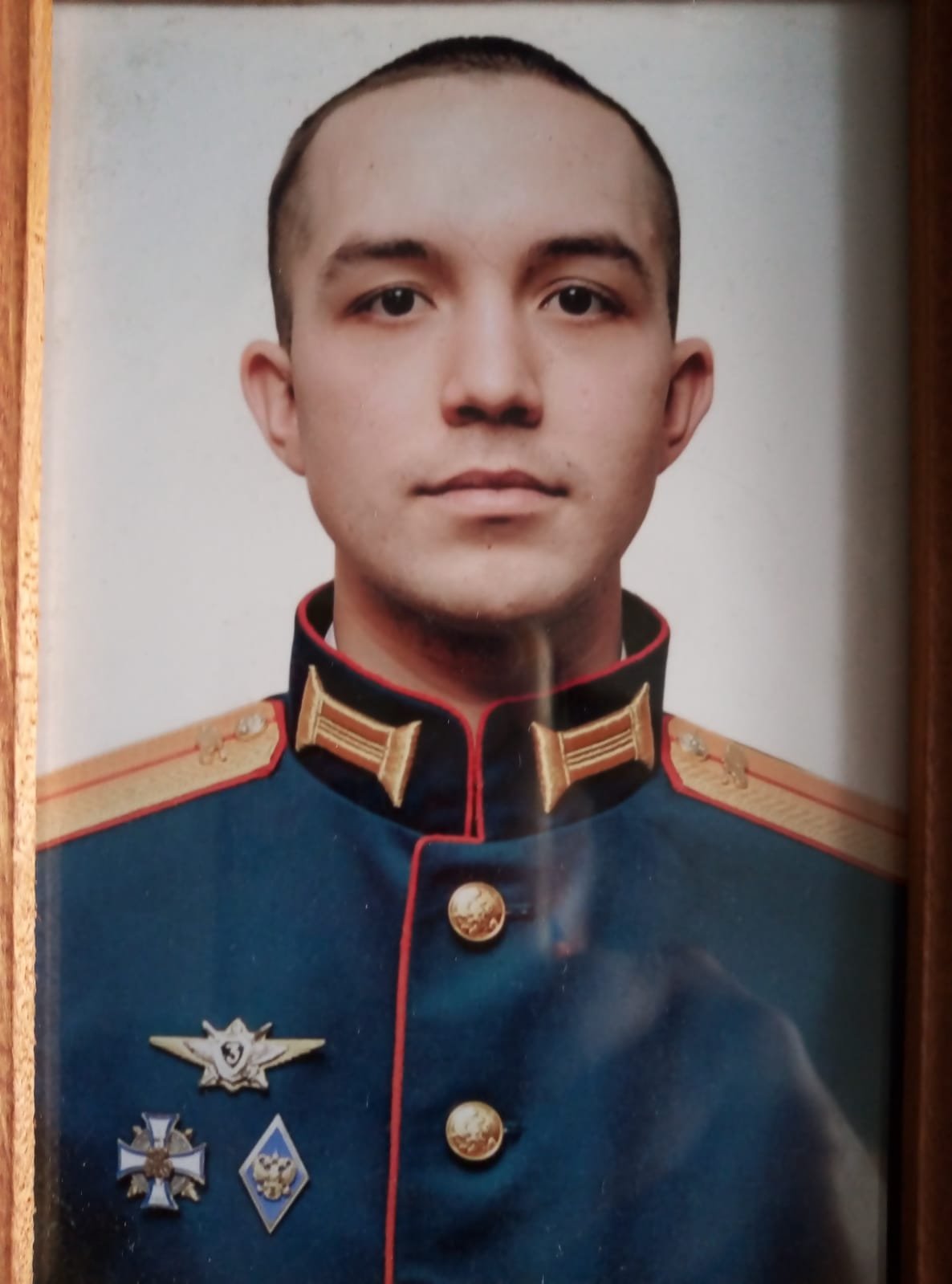
Aleksandr Baturin. Photo from personal archive
The document given to Lyudmila by the military officer who visited her house did not specify Baturin’s official status: it only said that she needed to provide a DNA sample to identify her son’s remains.
“This is what they do with all tank crewmen who were killed in an explosion. There’s nothing to identify, there are only pieces of meat left. The remains are all that’s left: their hands, legs, wrists. Maybe a part of the gut or something else. Do you understand what kind of remains are left after an explosion? If there’s no face left, they identify the body using the DNA samples of the parents. This is what they did with my son’s crew, because they had no faces left after the explosion. But I still don’t get it. My DNA does not match the third person’s remains. The man I saw in Rostov told me that it’s like my son wasn’t in the tank. There’s nothing, absolutely nothing!” Lyudmila exclaims.
“I don’t know, they must be looking for him somehow. I can’t find my son alive. I can’t find his remains. I can’t find him dead. He’s a man of the state, and he just disappeared. Poof! On the frontline, during active combat. The most important thing to me is finding my son. I get it, I’m under no illusions that he could still be alive. I’m under no illusions. He thought that it was his job, his line of work. When I tried to ask him ‘Sasha, what’s out there, what’s happening?’, his only response was ‘We’re doing our job’, and that’s it.”
***
Mediazona, BBC Russian and a team of volunteers earlier estimated that at least 3,798 Russian soldiers were killed in Ukraine. This is the death toll confirmed by open-source data: all these people were identified and buried. However, the stories of Sasha Baturin and the conscripts who served on the Moskva cruiser show that there are many unidentified and unaccounted for Russian soldiers killed in Ukraine. And it seems that no one is planning to document their deaths. Not even the Defence Ministry.
On the morning of 12 April, the General Staff of the Ukrainian Armed Forces reported that Ukrainian troops had thwarted six attacks by the Russian forces, destroying four tanks, five armoured vehicles, 26 cars and eight artillery systems of the enemy. The Operativno ZSU Telegram channel wrote in the early hours of 12 April that several V-marked Russian tanks had been destroyed by the Ukrainian forces. Baturin is not mentioned on any of the Ukrainian Telegram channels that publish information about Russian soldiers killed in Ukraine. The Russian officials should be the ones to find out where Sasha is, whether he is dead or alive, and inform his family about it.
Novaya Gazeta. Europe has sent a request to the Russian Defence Ministry and the Military Prosecutor’s Officer of the Ufa Garrison in Bashkortostan asking for the current whereabouts of Baturin Aleksandr Albertovich, an officer of Military Unit 91711 with an ID tag Э049790.
